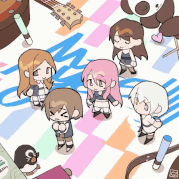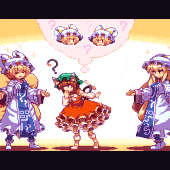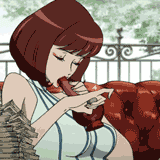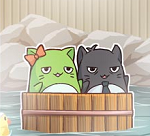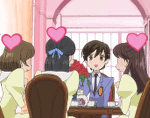|
Sakurazuka posted:Also in universe I'm pretty sure Kureha's mum wouldn't write an allegorical fairy tale about her daughter and then decide the best ending would be 'and they killed themselves and went to heaven'. Reia was unable to escape the system on multiple levels. Her giving misguided but well-intentioned advice really wouldn't be out of character. Besides, it's basically guaranteed that the girls won't be sticking to the plan, because it's an escape route for only two people. No way Lulu is getting left out. Cao Ni Ma posted:You are seeing the things literally in this show when everything is working on a metaphorical level and then excluding parts when they are inconvenient. Like I mentioned the last time, if you take things literally then Kumaria is literally dead since before the show started. The very act of her dying was what triggered the severance in the first place. I can do that because I remember this scene and this one. Kumaria starts looking a lot less benign when you remember how her image was used to whip an oppressed underclass into murdering people in search of her (never-given) approval. And while I realise that it's possible to be over-literal with this show (my favourite example is someone saying that there was no reason for the bears to eat girls because they're omnivorous), I'm having difficulty seeing many other ways you could interpret the explosion of Kumaris other than an oppressive system being created by an alien influence. If Kumaria is a natural, eternal force, why even include that scene? As for the Court, they exist to (a) ogle the girls and (b) force them to make arbitrary and damaging sacrifices in order to circumvent the rules of the world. It's textbook deal-with-a-devil territory that clearly places them as antagonistic, not least when you remember that they refuse to waive rules that could hurt people because 'rules are cool'.
|
|
|
|

|
| # ? May 17, 2024 20:06 |
|
The first dub episode hit and hoo boy is it something.
|
|
|
|
Darth Walrus posted:Her giving misguided but well-intentioned advice really wouldn't be out of character. "The author is dead" basically. Or her intentions dont matter she's propagating evil imagery because... reasons. quote:I can do that because I remember this scene and this one. Kumaria starts looking a lot less benign when you remember how her image was used to whip an oppressed underclass into murdering people in search of her (never-given) approval. And while I realise that it's possible to be over-literal with this show (my favourite example is someone saying that there was no reason for the bears to eat girls because they're omnivorous), I'm having difficulty seeing many other ways you could interpret the explosion of Kumaris other than an oppressive system being created by an alien influence. If Kumaria is a natural, eternal force, why even include that scene? quote:force them to make arbitrary and damaging sacrifices in order to circumvent the rules of the world. As for sacrifices, you dont think people have taken painful sacrifices to have their love acknowledged? Its a thousand times worse when doing so paints a huge target on your back from a sociological standpoint and darwin scratching his head from a biological one. It would be great if we lived an ideal world where there would no sacrifices, but I think the show has at least been realistic with the sort of metaphors they imply with the IS and the things you have to turn down in the courts. Also the rules are cool thing is basically a wordplay on characters names, which just about every character has. Lulu (Ruru) and Rules (Ruru), so the character is saying that rules are cool, but it makes it sound like Lulu is cool. Cao Ni Ma fucked around with this message at 18:26 on Mar 17, 2015 |
|
|
|
Cao Ni Ma posted:"Force"? The courts/Kumaria seem to be pretty into telling the people whats going to happen with the choices they take, and the girls seem to be pretty willing to follow through. It beats you over the head with the idea that the girls are doing this WILLINGLY. Do you want me find every single instance when the girls choose, either in the court room or in the stories? Like I mentioned the last time, unless they are doing the whole "we just let you climb the mountain so you would fall from higher" thing (which the show already has done rather overtly with Sumika and the IS),I dont the court is going to come out as "badguys". Likewise, Yuurika had no need to turn into a girl to be accepted by Reia in the first place, and it wasn't forced on her by the terrible father figure either. Her going to the court and making the trade to become human was entirely the result of her brokenness, and that was mostly due to malevolent outside forces.
|
|
|
|
Beef Waifu posted:The first dub episode hit and hoo boy is it something.
|
|
|
|
Yes
|
|
|
|
Cao Ni Ma posted:"The author is dead" basically. Or her intentions dont matter she's propagating evil imagery because... reasons. Doing or promoting bad things because of good intentions due to the way your circumstances distort your worldview is a recurring theme in this show - most of the main cast are guilty of it, but a particularly good example is Lulu. She wants to help the girl she loves reunite with her lost childhood sweetheart, but the warped definition of 'love' that the bears are taught basically means that she's been trying to aid and abet a rapemurder for most of the show. I absolutely do not dispute that Reia loved her daughter, but at the same time, she played the rigged, horrible game of this society. She lived the appropriate Class S life, fooling around with girls when she was younger and then growing out of it to become a housewife and mother. It absolutely would not be surprising for her idea of how best to escape the system to be a little bit wrong and odd. More to the point, her picturebook is suffused in the oppressive language of the show. Kumaria is a cross between a bird and a bear surrounded by stars. It doesn't really need to be explained at this point why bird and bear motifs are bad news (though if anyone needs a catchup, bears are murderous predators while birds represent confinement and conformity), but stars may need a bit of a reminder - they're the symbol of socially-approved love. This is spelled out in Episode Four, and Episode Four is also where the quest for the star of love claims its first victim, Milne. The Day of Severance, when Kumaria made her (literally) explosive advent and the bears went on their rapemurder orgy, is represented by falling stars. The bears' oppressive, exploitative religion uses stars instead of crosses. When Ginko fantasises about forcibly possessing Kureha, they are tied up by stars. Yuriika is raised by the abusive father who taught her her warped, destructive definition of love under a mobile decorated with birds and stars. We know bear symbols are bad news. We know bird symbols are bad news. We know star symbols are bad news. When a starry bear-bird tells you the only way to escape the oppressive system she heads is to commit something that sounds suspiciously like double-suicide, it should ring all the alarm bells. Your claim that the Court gave the girls a choice is disingenuous, too. It offers them the only way to circumvent an unfair, oppressive system, and demands the highest possible price in return. That's before you remember that the Court have now been explicitly identified as the living manifestations of the Wall of Severance that started this whole mess, too. 'They could just not make a deal with the devil' misses the entire dystopian point of the show, and saying 'love demands sacrifices, and that's OK' misses it even harder. This is a show about Japan's warped attitude to homosexuality. Treating society's obstacles to lesbian love as acceptable is anathema to it. You're missing all the context of that pun you identify, too. Beauty asks 'can't we help her?', Cool replies 'no, because rules are cool', and then they don't help her. If it's a pun, it's a downright vicious one - Lulu is cool, but rules are cooler. On a (largely) unrelated note, the Ekens and Creamer writeups are up. Darth Walrus fucked around with this message at 20:19 on Mar 18, 2015 |
|
|
|
 Oh morishima why did you post something like this right after the episode ended Rip lulu, you were the best bear
|
|
|
|
Welp, I guess someone didn't forget that lilies also represent death. Lulu's death was surprisingly effecting, especially when the music cut out suddenly, since I wasn't really sure I felt anything at all about these characters. Nice Little Mermaid reference, since it's allegedly an allegorical tale about Hans Christian Anderson being gay. Sakurazuka fucked around with this message at 00:01 on Mar 24, 2015 |
|
|
|
Oh huh, Funi changed Kumalia to Kumaria in episode 11, wonder if they retroactively changed it too? 
a kitten fucked around with this message at 01:12 on Mar 30, 2015 |
|
|
|
Nooooo I'm so sad. Goodbye, my hopes for an OT3. How many episodes are left, again?
|
|
|
|
|
meteloides posted:Nooooo I'm so sad. Goodbye, my hopes for an OT3. Just the last one, if memory serves correctly.
|
|
|
|
What the hell is an 'OT3'?
|
|
|
|
OneTrue Pair, but a threesome.
|
|
|
|
Oh. Ugh.
|
|
|
|
Sakurazuka posted:Oh. Ugh.
|
|
|
|
It's true I'm not really into either of those things though the latter is cool if you are.
|
|
|
|

|
|
|
|
Final episode was great. Had me laughing at one point because they were still reusing animation during the first half but then the second half hit and it was loving mindblowing.
|
|
|
|
RIP Lulu,] now you'll never graduate... summa kuma laude. 
|
|
|
|
Endorph posted:i watched a show about teenage lesbian rape, but the thought of a polygamous relationship disgusts me - a normal person how did you like the finale
|
|
|
|
Symbolism in the last episode is kinda confusing, maybe it'll make sense if I watch 11 & 12 again. Some thoughts / questions I guess: There's always been an undercurrent here that makes it seem like death and self-sacrifice is the only route out, and the way things close off feels like it still goes in that direction. I don't know if that's really the intent of the ending... The 'I'll smash myself' stuff combined with the scene setting (firing squad, plank off the edge of the roof) makes me feel like this is floating in a murky space right around lesbian suicides & active violent suppression of homosexuals, but that's probably the point. I'm just going to assume that Ginko & Kureha going away at the end is them abandoning the systems of the bear & girl worlds to go live by their own rules, and not literal death... 'Together forever now' I think the point with the girl in the ending bits & nasty bear is that Kureha & Ginko's example is going to slowly cause the system to change or at least lead girls to actively defy it. She's excluding herself by choice instead of passively being excluded like Kureha was, which is probably an improvement. I think the reason Kureha was 'guilty' and they framed her actions as pride is that she believed she had to change Ginko to protect her instead of changing herself to be able to be together with her. She chose the option that was easiest from her end of things, so choosing to become a bear at the end is the more noble of the two choices in that sense, I guess? It's a little confusing since if Kureha was the one who made a deal with the court, why didn't that make Ginko into a human girl? Maybe the example with Hatonaka and others is that the bears never actually become human girls, they're just impersonating them, so it wasn't a solution in the first place. Ginko wants to change and become human to be with Kureha and Kureha wants to change and become a bear to be with Ginko, so the two of them can actually be together (regardless of who actually has to change) We've had the bear symbolism from the beginning, with the overloading of 'eat' in the sexual and physical senses, and bears-as-predators used alongside bears-as-sexual-predators, like Hatonaka. Maybe the inverse of the symbolic role of the bears is chaste passivity, repression & self-denial, like we saw with Reia. In earlier episodes before we knew about the doorway through the wall it seemed plausible that girls had actually turned into bears; as of the last episode we know that's possible. So if both the human & bear roles in this show are symbolic, many of the bears hiding in the school could have been girls trying to conceal their passions and identities from others, and not bears that snuck across the wall. I guess the cannibalism makes that idea a bit complicated though Kumaria represented as Sumika isn't meant to be literal, right? I feel like it couldn't be but it's confusing. I guess it's possible that the whole idea there is that Kumaria appeared in front of Kureha (as Sumika) to test her love and give her a chance to make up for her past mistakes... The court breaking Kureha's handcuffs is interesting as a contrast to how they let Lulu die previously - it seems like they take mercy on Kureha here and help her out without requiring some sort of equivalent exchange, because she's admitted her past sins. Likewise Kumaria doesn't demand anything in exchange for making her into a bear. Did they let Lulu die as punishment for what she did to her little brother? That's kinda grim. Funimation updated the name of Lulu's little brother to Milne, which seems like it was probably intended as a reference to the author (Winnie the Pooh, etc). Cute. I was surprised by how things ended but I think it's better than most of the other ways the story could have resolved. An easy out writing-wise would have been for their true love to cause Ginko to become a real human girl, but that solves little (the two of them will still be excluded) and would undermine the themes of the show by making the solution for Ginko to conform. Lulu's death is unpleasant (and kind of a curveball - the art & writing didn't deathflag her) but makes sense as an eventual consequence for what she did when she was younger - it would be a little hollow for the show to let her off easy, even if death is perhaps excessive. Both characters had to sacrifice things (an important friend, their place in the world, etc) but as long as they're not literally dead at the end it feels like a reasonably satisfying conclusion. I'm really looking forward to seeing where Morishima takes things in her version of this. The chapters translated in the manga so far indicate she's serious about experimenting with some of the same themes as the show, and if anything it starts out darker than the show does.
|
|
|
|
Lulu's death was flagged to hell and back, I was expecting her to die as early as episode 9 but episode 10 purposely mislead the viewers. At episode 8 I already deduced that she was going to bite a bullet for ginko and her death would mirror her brothers, it just took longer to actually materializ. I'm not seeing her death as a punishment for her character given the end scenes and the fact that EP11 pretty much makes it obvious that Kumaria/the courts are just neutral enablers in regards to the story (Although Kumaria herself is also a representation of love, love itself is an enabler I guess). As for the symbols, the very last line of the show encapsulates what the intent was. Even though its difficult and painful to love who you want to love, have the personal courage to do so, and the world will change. The fact that the god is basically saying this means we have to interpret Utsuko's defection from the storm a sign that the world is already changing even if its just a tiny bit (and not that the storm will continue to operate normally). The invisible storm still exists but cracks are already becoming evident, Chouko is parroting the previous leaders ideology to try and convince herself that they are right even after all the girls and herself were physically shaken with what happened at the rooftop. An interesting wordplay, twintail girl's name is "Ai Utsuko" or Love to Shoot. While all other characters played on the themes for their names, this one actively went against it in the end.
|
|
|
|
This was a fun show if pretty muddled.
|
|
|
|
Yeah, I think that, as was worried about, the show didn't quite separate itself enough from the genre it was criticising in the end. In classic yuri and Class S works, lesbian love is treated as fundamentally incompatible with our world - you can either grow out of it and find a nice husband, or die together and find happiness in another world. Since love stories require us to empathise with the lovers, this is treated as tragic but inevitable. In other words, these works already criticise the cruelty of society that causes this, but offer little hope for improvement. Here, Ginko and Kureha's deaths inspire another pair of girls to resist society and pursue love to an uncertain but hopeful future, but come the hell on, this is the twenty-first century. There's a serious push for gay marriage in Japan. You can go a little further than that, especially in such a stylised work. This is an artistically spectacular work, particularly considering its shoestring budget, but its message is very late to the party even by the standards of Japanese lesbian literature.
|
|
|
|
Darth Walrus posted:Yeah, I think that, as was worried about, the show didn't quite separate itself enough from the genre it was criticising in the end. In classic yuri and Class S works, lesbian love is treated as fundamentally incompatible with our world - you can either grow out of it and find a nice husband, or die together and find happiness in another world. Since love stories require us to empathise with the lovers, this is treated as tragic but inevitable. In other words, these works already criticise the cruelty of society that causes this, but offer little hope for improvement. Here, Ginko and Kureha's deaths inspire another pair of girls to resist society and pursue love to an uncertain but hopeful future, but come the hell on, this is the twenty-first century. There's a serious push for gay marriage in Japan. You can go a little further than that, especially in such a stylised work. Yurikuma almost exclusively depicts the oppression and evil being perpetuated societally and culturally, not through laws or concrete systems (with the exception of the court, I guess). The girls convince themselves (and each other) to adhere to arbitrary standards and to exclude others, while the bears (at least as much as we see them) are using a religious figurehead (Kumaria) to justify their views and get people to listen to them. The characters in the series are hurt and excluded and oppressed by the things they believe and the things the girls around them believe, and that's what's difficult to change. I don't know if that is remotely an intentional thing on the part of the authors, but it is relatively representative. The real battle, at least in the west, is fighting the societal issues that make it difficult for queer people to be together - making gay marriage legal is only a tiny step in that direction. I don't want to veer way too far off into social territory but I think the show heavily emphasizes the idea that the girls are placing these constraints on themselves, instead of the constraints being entirely absolutes or externally enforced as they are in many other works I've encountered - that such relationships are impossible or unnatural or against the rules or fated to fail. In YKA it's almost exclusively about whether or not a relationship will be approved, and with the exception of the court all the approval/disapproval is being done by peers. An individual having conflicting/ambiguous desires is pretty rarely addressed as well and YKA at least briefly touches on it with Reia. A daughter isn't something she could have gotten exclusively out of her relationship with Hatonaka, and Kureha was obviously important to her. I won't argue that this wasn't used purely as a motive for Reia's demise but it represents a complicated issue that is almost never touched on in this genre. Still trapped within the constraints of the genre, though. Blech.
|
|
|
|
Kaelan Zero posted:This still afflicts a lot of yuri manga as well but I think there might be a good case for it in Yurikuma. Your general criticism is something I actually would aim somewhat at Morishima's work (though I like it quite a lot) and other notable 'good' yuri mangaka are especially guilty of it. Sure, those are fairly valid points, but as you say, in a culture and genre that's devoting an increasing amount of attention to how lesbians can live happily as lesbians, the fact remains that 'at least they died happily and inspired others' really isn't a revolutionary statement for such an overtly political show with such freedom to be ambitious.
|
|
|
|
Darth Walrus posted:Sure, those are fairly valid points, but in a culture and genre that's devoting an increasing amount of attention to how lesbians can live happily as lesbians, the fact remains that 'at least they died happily and inspired others' really isn't a revolutionary statement for such an overtly political show with such freedom to be ambitious. Wait lol is that really how it ends
|
|
|
|
Sharkopath posted:Wait lol is that really how it ends Close enough. I mean, there's the usual symbolic obfuscation, but...
|
|
|
|
Darth Walrus posted:Close enough. I mean, there's the usual symbolic obfuscation, but... That sounds like some weird having your cake and eating it too garbage, like we're gonna have this epic story about outdated 30 year old yuri tropes but follow them to the letter anyways. I don't think I'll finish up the series.
|
|
|
|
Sharkopath posted:That sounds like some weird having your cake and eating it too garbage, like we're gonna have this epic story about outdated 30 year old yuri tropes but follow them to the letter anyways. You could still give it a try, since it's a spectacularly-crafted work of art, but holy hell yeah is its messaging a throwback.
|
|
|
|
Its a pretty happy ending, but whats important is that its actually fairly realized. It doesn't pull it out of its rear end and it doesn't feel like an unrealistic copout given the themes it has. A happier ending would have the god come out and turn everyone into bears and now no one can hate each other because everyone is the bears but it really wouldn't be true to what its trying to say.
|
|
|
|
I am highly disappointed in the plot resolution.
|
|
|
|
Darth Walrus posted:You could still give it a try, since it's a spectacularly-crafted work of art, but holy hell yeah is its messaging a throwback. Naw I saw enough already and didn't like it.
|
|
|
|
Darth Walrus posted:Sure, those are fairly valid points, but as you say, in a culture and genre that's devoting an increasing amount of attention to how lesbians can live happily as lesbians, the fact remains that 'at least they died happily and inspired others' really isn't a revolutionary statement for such an overtly political show with such freedom to be ambitious. Yeah I'm not gonna bother finishing this, I think.
|
|
|
|
Kaelan Zero posted:Your general criticism is something I actually would aim somewhat at Morishima's work Admittedly i haven't read all of morishima's manga but come on.
|
|
|
|
to be honest if ikuhara wanted to make a point against the 'all lesbian romance is broken up by death' thing he would have just had anthy walking around in the background of every single shot and then the last episode you can see anthy and utena holding hands in the background welp, bye
|
|
|
|
Endorph posted:akiko morishima wrote a manga in which a 20-year-old and a 30-year-old date, fall in love, have sex, say things like 'Of all the people I've dated, you're the one I love the most," and then ends on them saying they were probably destined for each other, with nothing bad on the horizon whatsoever - the implication is that they're going to be spending the rest of their lives together. quote:In classic yuri and Class S works, lesbian love is treated as fundamentally incompatible with our world In almost every Morishima work I've read, men are scarce (if not entirely nonexistent) for the purpose of the story and its relationships. Characters may have previously had relationships with men, have fathers, have brothers etc but they are largely about all-girl environments - girls' schools, office ladies at largely (if not entirely) women-staffed offices, etc. Her characters are well-realized and her stories are deep and heartfelt and she does excellent work, but almost everything she writes can comfortably fit in at the edges of 'safe' Yuri in that it avoids actively representing, criticising or rejecting the current social order. Perhaps the right way to view this is that she writes her stories in a world where all these issues are dealt with, but if memory serves the idea of lesbian relationships being impossible or inferior does show up in multiple works by her, with a character being reticent about lesbian romance or having to be convinced that it's actually OK (I'm quite certain this shows up in Honey & Mustard but I can't remember any other examples for certain. Hanjuku Joshi, probably?) As a point of comparison - Amano Shuninta, one of Morishima's colleagues & friends, draws yuri manga that directly engages with the world more or less as it exists now. Men and heterosexual relationships and bisexual relationships exist, the idea that societal systems (or society, or peers, or family) may reject those relationships exists. This isn't really something that makes her work superior or inferior, but it's a very noticeable difference. It's an interesting comparison since Amano still adheres to a lot of the same formulas that Morishima does - largely-female casts, girl-only spaces, etc. The difference is most evident in that relationship conflicts in Amano's work can go to darker and more complex places. The idea of queer relationships being lesser or 'separate but equal' pervades a lot of the modern yuri I've read, though this is mostly stuff that it's been translated into English (and as a result probably wildly skewed by selection bias). Morinaga Milk is another accomplished, skilled yuri mangaka whose work sits comfortably in this same low/zero-conflict space (and in a couple cases, flirts with the intrinsically-doomed view of lesbian relationships... especially one of her recent works, which has a foiled suicide attempt.) Reia and Hakonaka's relationship in YKA is an interesting point here because I think it is undermined by existing in a girls-only bubble. Men are effectively excluded from depiction in this show, but if they weren't the conflict between R&H and the eventual results would be a more natural progression - a series of betrayals, Reia choosing someone that could offer what Hakonaka couldn't, etc. The way YKA handled this wasn't bad by any means but it felt slightly awkward to entirely circle around the question of how they went from their close relationship to Reia having a daughter. I should probably add a footnote that the Yurikuma Arashi manga has men present in the setting and seems likely to subvert all of my above criticisms :-)
|
|
|
|
i dont think writing a yuri manga without ~~~social commentary~~~ is worth criticizing though. it's okay to just focus on the relationship between the two women. not every romance needs to be a criticism of society. i like that fiction out there exists that isn't trying to be a social commentary, that just allows a lesiban relationship to be. i don't need a chapter of some random background man going 'dykes!!!' and then them crying about it for it to feel like a legitimate relationship. i don't think it's being 'safe' by doing that, rather, i think it's serving a valuable purpose as escapism for lesbians who *do* feel pressured by society.
|
|
|
|

|
| # ? May 17, 2024 20:06 |
|
I've read some Morishima stuff that has male homosexuals and touches a little on society, but those are short bits in 4koma.
|
|
|










